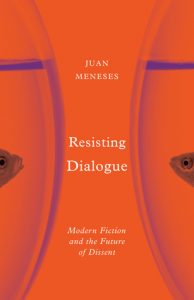In Resisting Dialogue: Modern Fiction and the Future of Dissent, Juan Meneses questions the assumption that dialogue is an inherent good, exploring how it can be deliberately used as a depoliticising force to eliminate dissent. Weaving together political theory and literary studies in order to propose a vision of dialogue that retains its subversive and radical potential, this bold and unconventional analysis offers a crucial meditation on our fraught times of ever-deepening social, cultural and political divides, writes Shikha Vats.
Resisting Dialogue: Modern Fiction and the Future of Dissent. Juan Meneses. University of Minnesota Press. 2019.
 Find this book (affiliate link):
Find this book (affiliate link): ![]()
From classical thinkers like Socrates and Cicero to contemporary figures like the Dalai Lama and Malala Yousafzai, all have vouched for the power of dialogue in resolving conflict. The book under review, however, takes the bold and unconventional stance of critiquing ‘dialogue’. In Resisting Dialogue, author Juan Meneses provocatively argues that in our modern age, dialogue is, in fact, a part of the problem, not the solution.
Lest we swiftly dismiss the author’s thesis as mere polemic, Meneses clarifies that his enquiry is meant ‘to explore how dialogue can be intentionally employed to eliminate dissent’ (5). In keeping with the tradition of Antonio Gramsci, the author identifies the covert, tactful and invisible side of dialogue as more dangerous than the forceful and violent dismissal of the same. The book develops its arguments by drawing on an interdisciplinary approach of integrating political theory with literary studies. By following a method of doing politics through reading literature, or what Meneses calls ‘reading dangerously’, the study proves to be an engaging enquiry aimed at rescuing the radical potential of dialogue.
Meneses contextualises the work within the idea of post-politics, which first originated in the post-Cold War period. Conceptualised by Jacques Rancière, Chantal Mouffe and Slavoj Žižek, post-politics indicates a global mode of consensus-based governance. Within such a framework, any possibility of imagining an alternative is effectively foreclosed by deploying an overriding logic of so-called pragmatic and realistic policymaking.
By situating the problem of dialogue within post-politics, the author examines the insidious ways in which dialogue is reduced to mere optics, meant to generate an attractive spectacle of inclusionary democracy. Meneses sets out to uncover the central role played by dialogue as a ‘disciplinary instrument’ (18) which is ultimately used to depoliticise rather than empower. In the face of such an ‘illusory dialogue’, the author proposes several ways of conducting a resisting dialogue which retains its subversive potential without being co-opted by hegemonic discourses.

Image Credit: Pixabay
The book teases out these counter-dialogic strategies through a close reading of several novels, beginning with the works of authors from the colonial period such as E.M. Forster and Jean Rhys, before moving to postmodern and contemporary novelists like Ian McEwan, Jeanette Winterson, Mohsin Hamid and Indra Sinha, among others. Taking into account an expansive temporal frame, the author traces the use and misuse of dialogic narrative to tackle questions ranging from colonial-postcolonial encounters, personal affect and political subjectivity to the much-debated issues of terrorism and climate change. The historical and context-based analysis firmly anchors the work by gauging lessons from the past alongside understanding the failure of present political movements.
Meneses binds the study together in a comprehensive structure which follows an appealing methodology of covering all the bases. The ‘Prologue’, combined with a detailed introduction, establishes the work within the above-mentioned context of post-politics which systematically thwarts all forms of dissent. The author provides a lucid explanation of how a dialogue between dominant and minor voices is a self-referential and performative hoax which works under the garb of representing all positions without disturbing the status quo.
This overview is followed by five chapters encompassing a discussion of diverging themes with respect to the central thesis. The three main chapters, which offer creative ways of enacting resistance, are interspersed with two shorter chapters – titled ‘contra’– which illuminate the failure of participating in a deceptive and vicious facade of dialogic exercise.
Chapter One, ‘Impasse’, offers a reading of Forster’s A Passage to India (1924) and Rhys’s Voyage in the Dark (1934) to examine the potent impossibility inherent in an encounter between the metropolis and the colony. The protagonists in these novels refuse the easy resolution desired by the colonial perspective through the generation of an autonomous postcolonial cosmopolitanism. This is achieved by arriving at a suspended deadlock which resists apolitical dialogue.
Similarly, Chapter Three posits ‘Deflection’ as a powerful strategy for escaping the all-pervasive grasp of a totalising neoliberal regime. McEwan’s The Child in Time (1987) and Winterson’s The Passion (1987) are read together for their activation of a political subjective agency through personal affective dimensions. Meneses explores the connections between Margaret Thatcher’s devastating policies, which began the erosion of the British welfare state, and David Cameron’s latter-day, seemingly humane yet more dangerous replication of the same through illusory dialogue.
Chapter Five presents another valuable technique of ‘Reframing’ to highlight the effective and ethical manner of employing dialogue in the urgent context of climate crisis. The chapter discusses Sinha’s Animal’s People (2007) and Helon Habila’s Oil on Water (2010) as important narrative interventions which lay open the category of a universal ‘anthropos’ as a non-neutral and deeply divided demography including the most vulnerable voices from the Global South.
This chapter, in the reviewer’s opinion, strikes the most relevant chord in terms of exposing the evident complicity and inaction of most present-day governments. With natural and man-made disasters raging on, governments and big corporations are involved in making a brilliant spectacle of political engagement, all the while continuing with their predetermined and unsustainable practices. Amitav Ghosh’s denouncement of the crisis as ‘the great derangement’ and Ajay Chaudhary’s appeal that ‘ecology does not unite all people’ identify the same argument that Meneses fleshes out – there simply does not exist an unexamined ‘we’ in the story of the Anthropocene.
Reading against the grain, Chapters Two and Four present the contrary view about the counter-productive and even totalising effects of involving oneself in a consensual dialogue. Meneses delineates the failure of an antagonistic and confrontational dialogic practice through a discussion of Graham Swift’s Waterland (1983) and Hamid’s The Reluctant Fundamentalist (2007). While the protagonist in the former novel is unable to comprehend the other minor voices of his own family members in a bid to construct a challenging version of his-story, the narrator of the latter novel ends up in a likely fatal encounter with the dominant voice. Although the critique is persuasive, it overlooks other aspects of the novels which may very well be counter-dialogic: for instance, the strongly provocative tone of Hamid’s narrator and the postmodernist narrative (not necessarily dialogue) which challenges the dominant history in Swift’s novel.
Nevertheless, with an innovative arrangement of chapters, Meneses enriches the conventional mode of academic writing with a dynamic and enlivening style. In spite of its engagement with a wide variety of novels, the study does not lose sight of the main argument and develops it meticulously through various historical contexts. The theoretical framework is dense, providing tools such as agonistic instead of antagonistic reading, and dissensual in place of consensual practices. In addition to literary and political theory, the book contains valuable explorations in emerging and cross-disciplinary spheres such as futurity studies, climate fiction and essentially any field preoccupied with imagining a more sustainable future for humankind. Resisting Dialogue is a crucial meditation on our fraught times of ever-deepening social, cultural and political divides, where all attempts at dialogue seem to be failing.
- This review first appeared at LSE Review of Books.
- Banner image credit: Pixabay
Please read our comments policy before commenting.
Note: This article gives the views of the author, and not the position of USAPP – American Politics and Policy, nor of the London School of Economics.
Shortened URL for this post: https://bit.ly/3pdIawi
About the reviewer
Shikha Vats – Indian Institute of Technology
Shikha Vats is a doctoral researcher at the Department of Humanities and Social Sciences, Indian Institute of Technology (IIT), Delhi, India.






